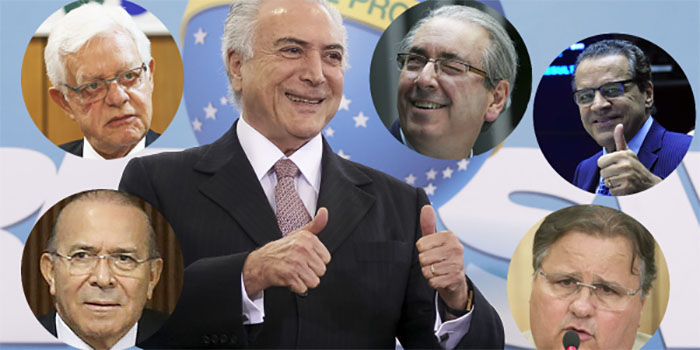- the head of Brazil’s Olympic Committee has been accused of vote rigging to win the Games for Rio;
- fire chiefs in Rio have been accused of selling safety licences;
- the vice-chancellor of the federal university in Santa Catarina has been accused of diverting funds intended for long distance learning;
- bank employees have been accused of ripping off savers;
- and even the firm paid to supply meals to Rio’s prisoners has been found to be providing substandard food, pocketing the difference in cost.

Brazil: King Canute and his gang
Temer defies the waves but they may engulf him
Sāo Paulo, 16 September: Like a tropical King Canute, president Michel Temer defies the waves of accusations battering his government, even when they are presented by the chief prosecutor himself.
https://www.youtube.com/watch?v=SR2ZsDt9SPk
credit: Metropoles.com
In a 240-page indictment, Rodrigo Janot, the chief prosecutor, has accused the president, his closest ministers and allies, all members of the PMDB, of forming a ‘quadrilhão’ – big criminal gang – which has stolen R$587 million (£140 million) from the public coffers over the last ten years.
The ‘gang’ is accused of taking bribes from corporations which wanted government contracts with state companies like Petrobrás, Furnas and the Caixa Econômica. The gang boss, aka President Temer, is also accused of obstructing the course of justice.
Gang members include ministers Elias Padilha, Moreira Franco, former ministers Henrique Alves and Geddel Vieira Lima – whose fingerprints were found on banknotes totalling R$51 million stored in suitcases and cardboard boxes at a borrowed flat in Salvador – and former speaker Eduardo Cunha. Agriculture minister Blairo Maggi was not a member of the gang – but is accused in a separate corruption scandal from his time as governor of Mato Grosso state. He is a member of the PP, which also includes Paulo Maluf, currently sought by Interpol, among its illustrious members.
Although the illegal scheme began in 2006 and carried on through the governments of both Lula and Dilma, Janot said it gathered strength after Temer took office and the PMDB moved to the centre of power. Temer’s residence, the Jaburu palace in Brasilia was the HQ of the scheme. Janot requested Temer’s removal from office and a prison term.
Temer violently denied his accusation, saying it was “magic realism in its purest state” and full of absurdities. He refused to sack his two accused ministers, going back on a promise made seven months ago when the accusations first surfaced. As to resigning from the presidency, the ‘gang boss’ is clearly staying put.
It is now up to Supreme Court justice Luis Edson Fachin to accept or reject the accusation against the president, a decision he will announce on Wednesday 20 September. If he accepts, it is then up to the Chamber of Deputies, the lower house, to decide whether the Supreme should proceed with the trial of the president.
In August a previous attempt to bring Temer to trial was rejected by Congress. But some jurists say the new attempt is more ‘robust’, because it is based not just on several plea bargain testimonies, but on evidence discovered during federal police investigations. In any case, it is a political decision by Congress, and once again the balance of power lies with the tucanos, the PSDB, who are part of the government’s political base and hold several ministries. Their dilemma is whether to continue in the government, holding their noses (or their beaks) at the stench of corruption all around them, or to abandon it, with one beady eye on next year’s elections.
The shocking accusations against Temer come as more and more corruption scandals erupt across Brazil. In the last few days:
